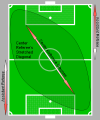the diagonal pattern is how you cover the field of play during the game as it gives you the best view of the field of play and keeps the assistant in view, generally it is best applied when working with neurtal assistants however it shouldnt be ignored when working on your own or with club assistants. following this path gives you a better angle on aerial challenges and a good view for identifying offsides, but dont stick to it rigidly, be prepared to follow play deep into the oppisite corners if the situation arrises but dont worry about getting too close to play if there's little danger.
this image sort of shows it:
View attachment 4898
the stepped approach is about dealing with dissent (or any other persistent offences):
the first step might be a quiet word with the offender in passing
the second delaying a restart to speak to a player publically
the third might be a warning with the captain
the fourth might be a yellow for dissent or persistent infringement
how you apply the steps depends on the scale of each offence and is absolutely not rigid. you could skip right to step 4 on your first offence or get 2 quiet words depending on when the offences take place in the game. a good observer should recognise when you adopt these steps as part of your game management and reward you accodingly (as long as they agree with how you applied it)






 . You didn't get your mark back then, but if it was as high as 60 I'd be amazed. It made me a much better referee, and I credit that assessor as having the biggest impact on my refereeing progression.
. You didn't get your mark back then, but if it was as high as 60 I'd be amazed. It made me a much better referee, and I credit that assessor as having the biggest impact on my refereeing progression.